
Ampittia dioscorides, the common bush hopper or simply bush hopper, is a species of butterfly found in India, China, Indochina, Cambodia and on to Borneo, Sumatra and Java belonging to the family Hesperiidae.

Delias pasithoe, the redbase Jezebel is a medium-sized butterfly of the family Pieridae, that is, the yellows and whites. The species is found in parts of South Asia and Southeast Asia. There has been some dispute for which species the specific name aglaja, used twice by Linnaeus in 1758, applies – the redbase Jezebel, or the dark green fritillary, a brush-footed butterfly. Here, Delias pasithoe is used for the redbase Jezebel, based on the replacement name proposed by Linnaeus himself.

Utetheisa pulchelloides, the heliotrope moth, is a moth of the family Erebidae. It is found in the Indo-Australian region including Borneo, Hong Kong, New Zealand, Papua, Seychelles, most of Australia,Tenerife and La Línea de la Concepción [Cádiz]. The species was first described by George Hampson in 1907.

Corcobara is a monotypic moth genus of the family Erebidae first described by Frederic Moore in 1882. Its only species, Corcobara angulipennis, described by the same author in the same year, is found in India, Thailand, Cambodia, Myanmar, Malaysia, Indonesia, New Guinea, Sri Lanka and the Solomons.
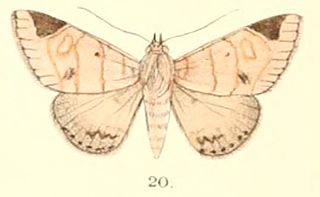
Dordura is a monotypic moth genus of the family Noctuidae erected by Frederic Moore in 1882. Its only species, Dordura aliena, was first described by Francis Walker in 1865. It is found in the Indian subregion, Sri Lanka, Myanmar, Thailand, Peninsular Malaysia, Sumatra, Borneo and New Guinea.

Dysphania is a genus of colourful moths in the family Geometridae and typical of the tribe Dysphaniini; they are sometimes called 'false tiger moths' and are found in northeast Australia, Melanesia, and south, east and southeast Asia.

Trigonodes hyppasia, the triangles or semi-looper, is a moth in the family Erebidae. The species was first described by Pieter Cramer in 1779. It is largely cosmopolitan, found throughout Borneo, Fiji, India, Maldives, Nepal, Sri Lanka, São Tomé and Príncipe, Taiwan, Thailand, Zimbabwe, northern Australia, and almost all African countries.

Dysphania militaris is a species of moth of the family Geometridae that is found from in the tropical regions of South and Southeast Asian countries such as China, India, Myanmar, Andaman Islands, Sumatra, Philippines and Java. It was first described by Carl Linnaeus in his 1758 10th edition of Systema Naturae.

Dysphania percota, the blue tiger moth, is a moth of the family Geometridae that can be found in India. It was first described by Charles Swinhoe in 1891.

Centroctena rutherfordi is a moth of the family Sphingidaefirst described by Herbert Druce in 1882. It is known from forests from Sierra Leone to Uganda and western Kenya. It is also found in the Usambara Mountains of north-eastern Tanzania.

Troides amphrysus, the Malay birdwing, is a birdwing butterfly in the genus Troides in the family Papilionidae.
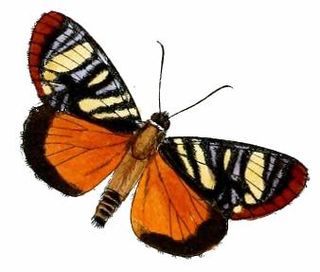
Polacanthopoda tigrina is a moth in the family Noctuidae first described by Herbert Druce in 1882. It is found in Cameroon, the Republic of Congo, the Democratic Republic of Congo, Gabon, Ghana, Guinea, Nigeria and Uganda.

Podomachla chromis is a moth in the family Erebidae first described by Herbert Druce in 1882. It is found in Cameroon, the Democratic Republic of the Congo and Equatorial Guinea.
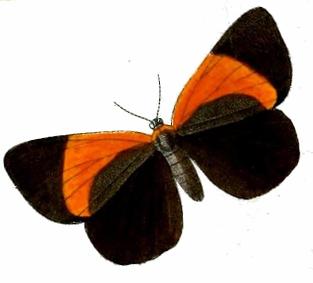
Chiasmia separata is a moth in the family Geometridae first described by Herbert Druce in 1882. It is found on Saint Helena and has also been recorded from South Africa, Angola, Cameroon, Ivory Coast, Kenya, Madagascar, Mozambique, Nigeria, Rwanda, Tanzania and Uganda.
Euphaedra cooksoni is a butterfly in the family Nymphalidae first described by Herbert Druce in 1905. It is found in the Democratic Republic of the Congo, Tanzania and Zambia.

Erebus hieroglyphica is a moth of the family Erebidae. It is found from the Oriental tropical countries such as India, Pakistan, Sri Lanka, Bangladesh, Japan, China, Taiwan, Cambodia, Laos, Myanmar, Thailand, Vietnam, Indonesia, Philippines, Malaysia, Singapore, and Korea. The habitat consist of lowland forests.
Trichaea pudens is a moth in the family Crambidae. It was described by Herbert Druce in 1902. It is found in Ecuador.

Catopyrops ancyra, or Felder's lineblue, is a species of butterfly belonging to the lycaenid family described by Cajetan Felder in 1860. It is found in the Indomalayan and Australasian realms.
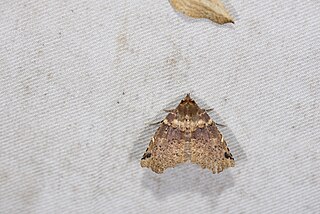
Falana sordida is a moth of the family Noctuidae first described by Frederic Moore in 1882.
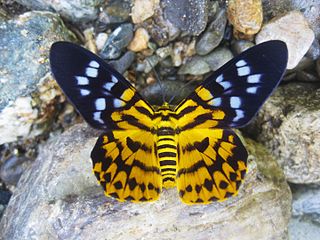
Dysphania subrepleta is a species of false tiger moth in the subfamily Geometrinae. Records are from Indo-China and western Malesia including Borneo, with no subspecies listed in the Catalogue of Life, where it is a "provisionally accepted name".



















